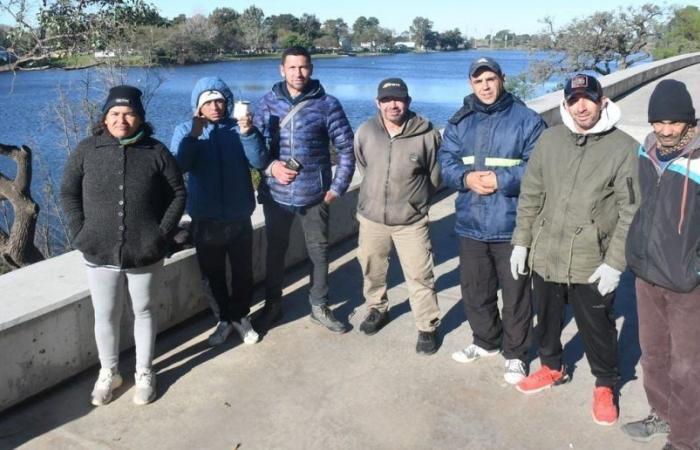Saturday 6/29/2024
/
Last update 0:38
At the beginning of May, the presence of car guards in the city of Santa Fe was prohibited. Some “dodge the law” and continue to be on the streets. Others obeyed the order and stopped this activity that put bread on the table every day, and began to do odd jobs for neighbors with whom they got along well.
But there were others, around 50, who were placed in cooperatives to carry out maintenance work in different parts of the provincial capital. El Litoral approached Parque del Sur to talk with eight former “trapitos” who make up a kind of crew and these days are carrying out the arduous task of weeding the perimeter of the Lago del Sur, shores that had not been cleaned for years. They also had to remove the famous cabbages from the water to keep the space clean.
There are about 50 former ragpickers in the city who have joined cooperatives and carry out maintenance tasks in different public spaces. Photo: Flavio Raina
David commented that he is happy with this opportunity: “We left the streets for something better for our future. We put together a very good team.” Another of the former car guards commented that what has changed is the day to day, because before as ragpickers they had the money every day, “now we have to wait a month – they get a salary of $150,000-. One has to adapt, but we hope that in the future we can achieve our goal of being workers in the Municipality.”
Although their situation was somewhat regularized when they were incorporated into a cooperative, in which they have to sign a form and meet schedules from Monday to Friday from 9 a.m. to 1 p.m., they warn that they do not have insurance, that is, if they have an accident while they work, they have to take charge themselves. Another difficulty they have is work tools. For example, to weed the lake they only have three machetes and a shovel.
One of the first jobs of this cooperative of former car guards is cleaning the perimeter of the South Lake. Photo: Flavio Raina
“We want the Municipality not to abandon us, that is the fear we have. We agreed because we had no other choice,” said Ricardo. In this sense, Diego pointed out that “we want to train, train and give us the tools so that tomorrow we can say that we were able to get out of this and thanks to the municipality we can train and have more support.”
See also
See also
From the ban to the dilemma: how long will it take for the labor inclusion of former trapitos in Santa Fe
They also agree that each one has his own life story, many are the pillar of a family that they must support day to day. “Many think that since we were car guards we don’t know how to do anything and that is not true. Now we are proving it,” they agreed.
Better conditions
When asked if they miss being car-sitters, the response was general: “Not really. I am grateful that they took us off the streets because we were cold, hungry, and we didn’t even have money to drink mate. Sometimes I had to take my family through the same cold as me, going home with $3,000 or $4,000 and trying to cook with that all day. From the fights that took place in the street, someone else would arrive in a complicated situation (drunk or drugged) and one would have to risk everything for little money. This is the good thing we rescued.”
“We want to train ourselves, train ourselves and give us the tools so that tomorrow we can say that we were able to get out of this and thanks to the municipality we can train ourselves and have another livelihood,” said Diego, a former trapito from the city. Photo: Flavio Raina
As every change has its adaptation period, “it takes a bit to adapt. Now we keep schedules, we had another habit. That’s where we arrived at the place where we took care of cars and we were there from 8 in the morning until night. Some of us spent 5, 10 or 15 years in a fixed location and they already knew us and we had our clients. But now the street is not like before,” said Diego.
See also
See also
Car wash and tire shop: a first idea to include the “ragitos” in Santa Fe
In addition to this group, there are other former car guards in other cooperatives and they carry out maintenance tasks in different neighbourhoods such as Santa Rosa or Barranquitas. There are also some who did not accept this change. “Many did not like the prohibition of the activity,” commented David.
Fernanda is the only woman in this cooperative. She developed her activity as a car sitter for more than two years with her husband. “This opportunity seems good to me, at least to be able to get off the street,” she thanked.


